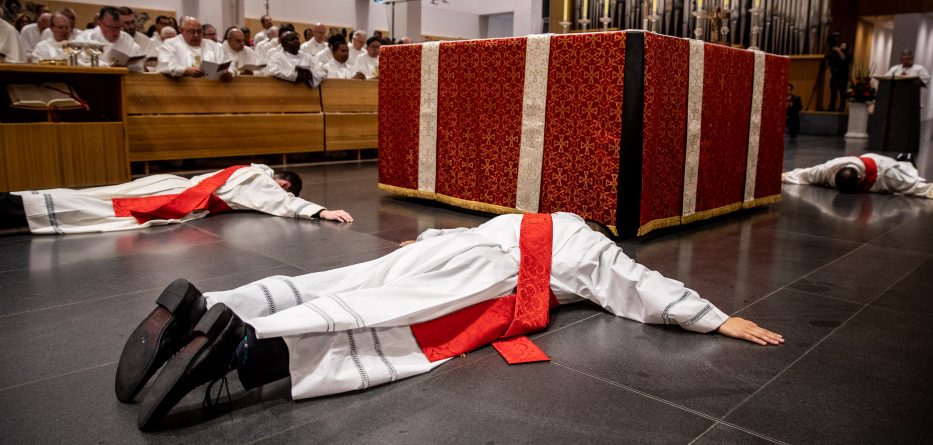Post-Synodal Apostolic Exhortation
CHRISTUS VIVIT
of the Holy Father
FRANCIS
to Young People and to the entire People of God
1. CHRIST IS ALIVE! He is our hope, and in a wonderful way he brings youth to our world. The very first words, then, that I would like to say to every young Christian are these: Christ is alive and he wants you to be alive!
2. He is in you, he is with you and he never abandons you. However far you may wander, he is always there, the Risen One. He calls you and he waits for you to return to him and start over again. When you feel you are growing old out of sorrow, resentment or fear, doubt or failure, he will always be there to restore your strength and your hope.
3. With great affection, I address this Apostolic Exhortation to all Christian young people. It is meant to remind you of certain convictions born of our faith, and at the same time to encourage you to grow in holiness and in commitment to your personal vocation. But since it is also part of a synodal process, I am also addressing this message to the entire People of God, pastors and faithful alike, since all of us are challenged and urged to reflect both on the young and for the young. Consequently, I will speak to young people directly in some places, while in others I will propose some more general considerations for the Church’s discernment.
4. I have let myself be inspired by the wealth of reflections and conversations that emerged from last year’s Synod. I cannot include all those contributions here, but you can read them in the Final Document. In writing this letter, though, I have attempted to summarize those proposals I considered most significant. In this way, my words will echo the myriad voices of believers the world over who made their opinions known to the Synod. Those young people who are not believers, yet wished to share their thoughts, also raised issues that led me to ask new questions.
CHAPTER EIGHT
Vocation
248. The word “vocation” can be understood in a broad sense as a calling from God, including the call to life, the call to friendship with him, the call to holiness, and so forth. This is helpful, since it situates our whole life in relation to the God who loves us. It makes us realize that nothing is the result of pure chance but that everything in our lives can become a way of responding to the Lord, who has a wonderful plan for us.
249. In the Exhortation Gaudete et Exsultate, I spoke about the vocation of all to grow and mature for the glory of God; I wanted “to repropose the call to holiness in a practical way for our own time, with all its risks, challenges and opportunities”.136 (136 Apostolic Exhortation Gaudete et Exsultate (19 March 2018), 2.) The Second Vatican Council helped us to recognize anew this call addressed to each of us: “All the faithful, whatever their condition or state, are called by the Lord, each in his or her own way, to that perfect holiness by which the Father himself is perfect”.137 (137 Dogmatic Constitution on the Church Lumen Gentium, 11.)
God’s call to friendship
250. The first thing we need to discern and discover is this: Jesus wants to be a friend to every young person. This discernment is the basis of all else. In the risen Lord’s dialogue with Simon Peter, his great question was: “Simon, son of John, do you love me?” (Jn 21:16). In other words, do you love me as a friend? The mission that Peter received to shepherd Jesus’ flock will always be linked to this gratuitous love, this love of friendship.
251. On the other hand, there was the unsuccessful encounter of Jesus and the rich young man, which clearly shows that the young man failed to perceive the Lord’s loving gaze (cf. Mk 10:21). He went away sorrowful, despite his original good intentions, because he could not turn his back on his many possessions (cf. Mt 19:22). He missed the opportunity of what surely would have been a great friendship. We will never know what that one young man, upon whom Jesus gazed with love and to whom he stretched out his hand, might have been for us, what he might have done for mankind.
252. “The life that Jesus gives us is a love story, a life history that wants to blend with ours and sink roots in the soil of our own lives. That life is not a salvation up ‘in the cloud’ and waiting to be downloaded, a new ‘app’ to be discovered, or a technique of mental self-improvement. Still less is that life a ‘tutorial’ for finding out the latest news. The salvation that God offers us is an invitation to be part of a love story interwoven with our personal stories; it is alive and wants to be born in our midst so that we can bear fruit just as we are, wherever we are and with everyone all around us. The Lord comes there to sow and to be sown”.138 (138 Address at the Vigil, XXXIV World Youth Day in Panama (26 January 2019): L’Osservatore Romano, 28-29 January 2019, 6.)
Being there for others
253. I would now like to speak of vocation in the strict sense, as a call to missionary service to others. The Lord calls us to share in his work of creation and to contribute to the common good by using the gifts we have received.
254. This missionary vocation thus has to do with service. For our life on earth reaches full stature when it becomes an offering. Here I would repeat that “the mission of being in the heart of the people is not just a part of my life or a badge I can take off; it is not an ‘extra’ or just another moment in life. Instead, it is something I cannot uproot from my being without destroying my very self. I am a mission on this earth; that is the reason why I am here in this world”.139 (139 Apostolic Exhortation Evangelii Gaudium (24 November 2013), 273: AAS 105 (2013), 1130.) It follows that every form of pastoral activity, formation and spirituality should be seen in the light of our Christian vocation.
255. Your own personal vocation does not consist only in the work you do, though that is an expression of it. Your vocation is something more: it is a path guiding your many efforts and actions towards service to others. So in discerning your vocation, it is important to determine if you see in yourself the abilities needed to perform that specific service to society.
256. This gives greater value to everything you do. Your work stops being just about making money, keeping busy or pleasing others. It becomes your vocation because you are called to it; it is something more than merely a pragmatic decision. In the end, it is a recognition of why I was made, why I am here on earth, and what the Lord’s plan is for my life. He will not show me every place, time and detail, since I will have to make my own prudent decisions about these. But he will show me a direction in life, for he is my Creator and I need to listen to his voice, so that, like clay in the hands of a potter, I can let myself be shaped and guided by him. Then I will become what I was meant to be, faithful to my own reality.
257. To respond to our vocation, we need to foster and develop all that we are. This has nothing to do with inventing ourselves or creating ourselves out of nothing. It has to do with finding our true selves in the light of God and letting our lives flourish and bear fruit. “In God’s plan, every man and woman is meant to seek self-fulfillment, for every human life is called to some task by God”.140 (140 SAINT PAUL VI, Encyclical Letter Populorum Progressio (26 March 1967), 15: AAS 59 (1967), 265.) Your vocation inspires you to bring out the best in yourself for the glory of God and the good of others. It is not simply a matter of doing things, but of doing them with meaning and direction. Saint Alberto Hurtado told young people to think very seriously about the direction their lives should take: “If the helmsman of a ship becomes careless, he is fired straightaway for not taking his sacred responsibility seriously. As for our lives, are we fully aware of the course they are taking? What course is your life taking? If it is necessary to give this more thought, I would beg each one of you to give it the highest consideration, because to get it right is tantamount to success; to err is quite simply to fail”.141 (141 Meditación de Semana Santa para jóvenes, written aboard a cargo ship returning from the United States in 1946. The text can be found at: https://www.padrealbertohurtado.cl/escritos-2/)
258. In the life of each young person, this “being there for others” normally has to do with two basic issues: forming a new family and working. Surveys of young people repeatedly confirm that these are the two major issues worrying them and, at the same time, exciting them. Both must be the object of particular discernment.
Let us look briefly at each of them.
Love and family
259. Young people intensely feel the call to love; they dream of meeting the right person with whom they can form a family and build a life together. This is undoubtedly a vocation which God himself makes known to them through their feelings, desires and dreams. I dwelt more fully on this theme in the Apostolic Exhortation Amoris Laetitia. I would encourage all young people to read especially the fourth and fifth chapters of that Exhortation.
260. I like to think that “two Christians who marry have recognized the call of the Lord in their own love story, the vocation to form one flesh and one life from two, male and female. The Sacrament of Holy Matrimony envelops this love in the grace of God; it roots it in God himself. By this gift, and by the certainty of this call, you can go forward with assurance; you have nothing to fear; you can face everything together!”142 (142 Meeting with the Young People of Umbria in Assisi (4 October 2013): 105 (2013), 921.)
261. Here, we need to remember that God created us as sexual beings. He himself “created sexuality, which is a marvellous gift to his creatures”.143 (143 Post-Synodal Apostolic Exhortation Amoris Laetitia (19 March 2016), 150: AAS 108 (2016), 369.) Within the vocation to marriage we should acknowledge and appreciate that “sexuality, sex, is a gift from God. It is not taboo. It is a gift from God, a gift the Lord gives us. It has two purposes: to love and to generate life. It is passion, passionate love. True love is passionate. Love between a man and a woman, when it is passionate, always leads to giving life. Always. To give life with body and soul”.144 (144 Address to Young People from the Diocese of Grenoble-Vienne (17 September 2018): L’Osservatore Romano, 19 September 2018, 8.)
262. The Synod insisted that “the family continues to be the principal point of reference for young people. Children appreciate the love and care of their parents, they give importance to family bonds, and they hope to succeed in forming a family when it is their time. Without doubt, the increase of separations, divorces, second unions and single-parent families can cause great suffering and a crisis of identity in young people. Sometimes they must take on responsibilities that are not proportioned to their age and that force them to become adults before their time. Often, grandparents are a crucial aid in affection and religious education: with their wisdom they are a vital link in the relationship between generations”.145 (145 FD 32.)
263. It is true that the difficulties they experience in their own family can lead many young people to ask whether it is worthwhile to start a new family, to be faithful, to be generous. I can tell you that it certainly is. It is worth your every effort to invest in the family; there you will find the best incentives to mature and the greatest joys to experience and share. Don’t let yourselves be robbed of a great love. Don’t let yourselves be led astray by those who propose a life of rampant individualism that in the end leads to isolation and the worst sort of loneliness.
264. Today, a culture of the ephemeral dominates, but it is an illusion. To think that nothing can be definitive is a deceptive lie. “Today, there are those who say that marriage is out of fashion… In a culture of relativism and the ephemeral, many preach the importance of ‘enjoying’ the present moment. They say that it is not worth making a life-long commitment, making a definitive decision… I ask you, instead, to be revolutionaries, I ask you to swim against the tide; yes, I am asking you to rebel against this culture that sees everything as temporary and that ultimately believes you are incapable of responsibility, incapable of true love”.146 (146 Meeting with Volunteers, XXVIII World Youth Day in Río de Janeiro (28 July 2013): Insegnamenti 1, 2 (2013), 125.) I have great confidence in you, and for this very reason, I urge you to opt for marriage.
265. Marriage requires preparation, and this calls for growing in self-knowledge, developing the greater virtues, particularly love, patience, openness to dialogue and helping others. It also involves maturing in your own sexuality, so that it can become less and less a means of using others, and increasingly a capacity to entrust yourself fully to another person in an exclusive and generous way.
266. As the bishops of Colombia have taught, “Christ knows that spouses are not perfect and that they need to overcome their weakness and lack of constancy so that their love can grow and endure. For this reason, he grants spouses his grace, which is at once light and the strength enabling them to achieve progressively their ideal of married life in accordance with God’s plan”.147 (147 EPISCOPAL CONFERENCE OF COLOMBIA, Mensaje Cristiano sobre el matrimonio (14 May 1981).)
267. For those who are not called to marriage or the consecrated life, it must always be remembered that the first and most important vocation is the vocation we have received in baptism. Those who are single, even if not by their own choice, can offer a particular witness to that vocation through their own path of personal growth.
Work
268. The bishops of the United States have pointed out that “young adulthood often signals a person’s entrance into the world of work. ‘What do you do for a living?’ is a constant topic of conversation because work is a major part of their lives. For young adults, this experience is highly fluid because they move from job to job and even from career to career. Work can dictate their use of time and can determine what they can afford to do or buy. It can also determine the quality and quantity of leisure time. Work defines and influences a young adult’s identity and self-concept and is a prime place where friendships and other relationships develop because generally it is not done alone. Young men and women speak of work as fulfilling a function and providing meaning. Work allows young adults to meet their practical needs but even more importantly to seek meaning and fulfilment of their dreams and visions. Although work may not help achieve their dreams, it is important for young adults to nurture a vision, learn how to work in a truly personal and life-giving way, and to continue to discern God’s call”.148 (148 UNITED STATES CONFERENCE OF CATHOLIC BISHOPS, Sons and Daughters of Light: A Pastoral Plan for Ministry with Young Adults, November 12, 1996, Part One, 3.)
269. I ask young people not to expect to live without working, depending on others for help. This is not good, because “work is a necessity, part of the meaning of life on this earth, a path to growth, human development and personal fulfilment. In this sense, helping the poor financially must always be a provisional solution in the face of pressing needs”.149 (149 Encyclical Letter Laudato Si’ (24 May 2015), 128: AAS 107 (2015), 898.) Hence, “together with the awe-filled contemplation of creation which we find in Saint Francis of Assisi, the Christian spiritual tradition has also developed a rich and balanced understanding of the meaning of work, as, for example, in the life of Blessed Charles de Foucauld and his followers”.150 (150 Ibid., 125: AAS 107 (2015), 897.)
270. The Synod noted that in the area of work, young people can “experience forms of exclusion and marginalization, of which the first and most serious is youth unemployment, which in some countries reaches exorbitant levels. Besides making them poor, the lack of work impacts negatively on young people’s capacity to dream and to hope, and it deprives them of the possibility of contributing to the development of society. In many countries, this situation depends on the fact that some sectors of the young population lack adequate professional skills, perhaps because of deficiencies in the system of education and training. Often job insecurity among the young is linked to economic interests that exploit labour”.151 (151 FD 40.)
271. This is a highly complex and sensitive issue that politics must make a priority, especially at present, when the speed of technological advances and the concern to reduce labour costs can lead quickly to the replacement of many jobs by machines. It is also a crucial societal issue because employment for a young person is not merely a means of making money. Work is an expression of human dignity, a path of development and of social inclusion. It is a constant stimulus to grow in responsibility and creativity, a protection against the tendency towards individualism and personal gratification. At the same time, it is an opportunity to give glory to God by developing one’s abilities.
272. Young people do not always have the chance to decide what kind of work they will do, or how their energies and talents will be spent. Because, alongside their own aspirations, abilities and choices, there is the harsh reality of the job market. It is true that you cannot live without working, and that sometimes you have to accept whatever is available, but I ask you never to give up on your dreams, never completely bury a calling, and never accept defeat. Keep seeking at least partial or imperfect ways to live what you have discerned to be your real calling.
273. When we discover that God is calling us to something, that this or that is what we were made for – whether it be nursing, carpentry, communication, engineering, teaching, art or any other kind of work – then we will be able to summon up our best capacities for sacrifice, generosity and dedication. Knowing that we don’t do things just for the sake of doing them, but rather we endow them with meaning, as a response to a call that resounds in the depth of our being to offer something to others: that is what makes these occupations bring a sense of deep fulfilment. As we read in the ancient biblical book of Ecclesiastes: “I saw that there was nothing better than that a man should enjoy his work” (3: 22).
The vocation to special consecration
274. If we are indeed convinced that the Holy Spirit continues to inspire vocations to the priesthood and the religious life, we can “once more cast out the nets” in the Lord’s name, with complete confidence. We can dare, as we should, to tell each young person to ask whether this is the path that they are meant to follow.
275. Occasionally, I would bring this up with young people, and they would respond almost jokingly: “No, that’s not for me!” Yet, a few years later, some of them were in the seminary. The Lord cannot fail in his promise to provide the Church with shepherds, for without them she would not be able to live and carry out her mission. If it is true that some priests do not give good witness, that does not mean that the Lord stops calling. On the contrary, he doubles the stakes, for he never ceases to care for his beloved Church.
276. In discerning your vocation, do not dismiss the possibility of devoting yourself to God in the priesthood, the religious life or in other forms of consecration. Why not? You can be sure that, if you do recognize and follow a call from God, there you will find complete fulfilment.
277. Jesus is walking in our midst, as he did in Galilee. He walks through our streets, and he quietly stops and looks into our eyes. His call is attractive and intriguing. Yet today the stress and quick pace of a world constantly bombarding us with stimuli can leave no room for that interior silence in which we can perceive Jesus’ gaze and hear his call. In the meantime, many attractively packaged offers will come your way. They may seem appealing and exciting, although in time they will only leave you feeling empty, weary and alone. Don’t let this happen to you, because the maelstrom of this world can drive you to take a route without real meaning, without direction, without clear goals, and thus thwart many of your efforts. It is better to seek out that calm and quiet that enable you to reflect, pray, look more clearly at the world around you, and then, with Jesus, come to recognize the vocation that is yours in this world.
Given in Loreto, at the Shrine of the Holy House, on 25 March, Solemnity of the Annunciation of the Lord, in the year 2019, the seventh of my Pontificate.
Franciscus
Chapter Nine will be published tomorrow.
To view Chapter Seven, click here.
To view Chapter Six, click here.
To view Chapter Five, click here.
To view Chapter Four, click here.
To view Chapter Three, click here.
To view Chapter Two, click here.
To view Chapter One, click here.
With thanks to the Vatican.








